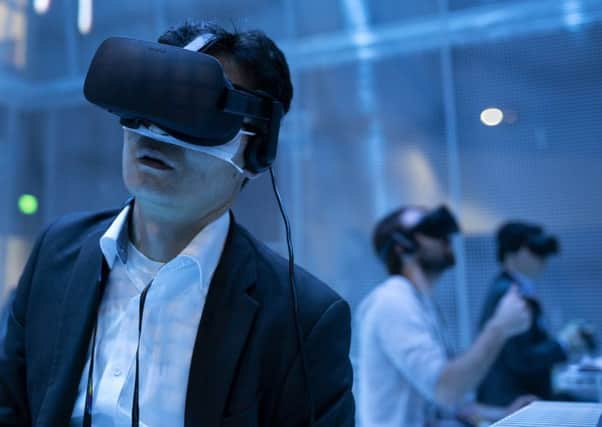Martyn McLaughlin: Don't believe hype about gigs in your living room


The chance to witnesss your favourite band perform in the comfort of your living room would be a gig to remember – at least if they really were up close and personal.
The prospect of bringing some of the biggest names in world music directly into the homes of fans was under discussion at the weekend as part of Great Escape, a music festival which melded traditional live performances with discussion of what the future might hold.
Advertisement
Hide AdThe Brighton event, part knees-up, part conference, heard from music industry veterans and tech entrepreneurs, two disparate groups united by their excitement over virtual reality.
A generation after technological innovations such as Napster upturned the economics of the global industry, the festival provided a platform for those who believe the latest wave of change will be a help, not a hindrance, to their business model.
Among those in attendance were representatives from MelodyVR, a London-based startup which launched earlier this month. It has been deploying a phalanx of high-resolution cameras at various locations around live venues, fastidiously recording performances by an array of artists, from The Who and KISS through to David Guetta and the London Symphony Orchestra.
By being able to switch between various views provided by a virtual reality headset, stay-at-home gig goers are able to take in the concert from the throng, or should they wish, join the action onstage from the band’s vantage point.
With lucrative partnerships already in place with big name music labels like Warner, Sony, and Universal, the firm’s share price is on the up. Its plan is to sell access not just to archived concerts it has recorded, but to allow people to witness live-streamed gigs and entire music festivals in real time, all for a fraction of the ticket price.
As Nikki Lambert, chief marketing officer at MelodyVR, reasoned: “It’s hard to convince someone to spend money and an evening out to see a new band they’ve never heard of, but using VR means you can have a great experience at a much lower cost of entry.”
Advertisement
Hide AdWhile I cannot quite fathom the appeal of being within licking distance of Gene Simmons’s tongue, I can appreciate how this novel use of technology might be an aid for those unable to attend a venue in person, whether it be due to disability or financial restraints. But the idea that MelodyVR and other companies like it can accurately replicate the experience of being there in person seems disingenuous at best.
I have lost count of the number of times consumers have been promised that virtual reality is the future. It is a form of technology that has been forever poised on the cusp of a revolution, and yet it remains a niche interest.
Advertisement
Hide AdBack in 1991, Computer Gaming World predicted there would be “affordable VR by 1994”. Three decades later, VR remains little more than a novelty factor in the videogame industry. Any number of ill-conceived plasticky headsets have been consigned to the dustbin of history as manufacturers eager to make a quick buck realised they could never breach the mass-market.
The latest iteration of virtual reality devices, such as Oculus Rift, Samsung Gear, HTC Vive, and PlayStation VR, are powerful and impressive applications with relatively modest price points, yet they too have failed to capture the public’s imagination. If virtual reality’s charms have been snubbed by gamers – a demographic willing to upgrade technology every other year in search of a more immersive experience – it seems naive to presume music fans will buck the trend.
In any case, can technology ever really emulate the experience of feeling the glorious, shifting dynamic between an artist and their audience?
How many cameras and microphones would it have taken to replicate the sense of wonder and acrimony when Bob Dylan plugged his guitar into his amp at Newport Folk Festival?
What about the tubthumping bedlam of Johnny Cash letting rip for Folsom prison’s inmates? Or the riotous delights of Suicide’s confrontational 23-minute gig before a bewildered crowd in Brussels’ Ancienne Belgique?
There is a power and rawness to great gigs which defies description, let alone emulation. No amount of sensors can recreate the communal roar that greets the first chord, or the cooling spray as a plastic pint glass of indeterminate liquid whizzes towards the stage.
Advertisement
Hide AdThere is also a sound economic argument against MelodyVR’s ideas. If anything, the transformational impact of technology on the music industry has cemented the importance of live gigs.
Whereas once they were viewed by more cynical artists as a promotional tool to bolster album sales, the meagre sums they receive nowadays from physical album sales and streaming services like Spotify means that gigs are a crucial source of revenue.
Advertisement
Hide AdMaybe MelodyVR’s grand plan will work. Maybe there is a generation of music aficionados who have become so jaded with the secondary ticketing market and exorbitant food and drink costs at major venues, they will decide that their home is the best setting for live music after all.
Yet somehow, I doubt the initiative will ever amount to anything more than a curio. If the history of the future is any guide, virtual reality’s time has yet to come.
